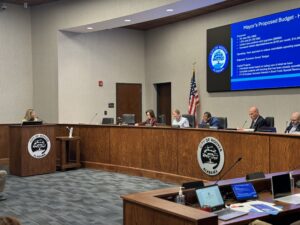Alabama commission looks at further grocery tax cuts, potential revenue replacement

Alabama commission looks at further grocery tax cuts, potential revenue replacement by Jemma Stephenson, Alabama Reflector November 15, 2023 Members of a state commission looking at the impact of grocery tax repeal looked at the recent cut to the tax, the potential for slower education budget growth, and alternate revenues. Alabama in September cut the state’s 4% tax on groceries to 3%, the first reduction in the tax since it was first implemented in 1939. Prior to the cut, Alabama was one of only three states that fully taxed groceries, driving some local levies as high as 10%. Cuts to the tax have been a long-term goal of anti-poverty groups, which said the tax affected food security and the ability of low-income Alabamians to feed children, as well as conservatives in favor of cutting taxes. “It impacts lower income Alabamians more harshly than it impacts higher income Alabamians,” said commission member Akiesha Anderson, policy and advocacy director of Alabama Arise. The bill froze but did not reduce local taxes on groceries. If the Education Trust Fund (ETF) budget, where proceeds from the tax go, grows by 3.5% next year, the state tax will be cut to 2%. “We’re all excited about that possibility coming sooner rather than later,” said Sen. Andrew Jones, R-Centre. Kirk Fulford, deputy director of the fiscal division of the legislative services agency, said Tuesday that “later” seemed more likely. The director told the committee that he was not predicting growth in the ETF for Fiscal Year 2024. “Just based on the first month, I mean, we’re in negative growth,” said Fulford after the meeting. Publicly available information on the Education Trust Fund shows that income tax returns were lower in October than they were last October, the biggest drop in the Education Trust Fund. The Education Trust Fund is around $74.4 million lower than it was this time last year. About $54.7 million of that decrease is from income tax. Fulford said to reporters after the meeting that there are four parts to the income tax. He said withholding, or taxes withheld from a paycheck, has kept up with Alabama’s low unemployment. “The other components are what, first of all, jumped way up and then last year came right back down,” he said to reporters after the meeting. Fulford said over email before the meeting that October 2022 receipts last year were up by $65 million, so this year could be a return to normalcy after several years of drastic increases. Fulford said cutting local grocery taxes could affect local governments, who sometimes levy higher taxes on groceries than the state. “So there would be a bigger dollar figure impact at the local level if you eliminated all the groceries,” he said. House Ways and Means Education Committee chair Danny Garrett, R-Trussville, said in October that he did not expect to cut the tax further in the next legislative session, which begins in February. Commissioners brought up a number of different ways that revenues could be potentially restored to the Education Trust Fund. Anderson said she thinks that more tax dollars for education means better education. Alabama spends less on average than the national average on per pupil spending. According to the U.S. Census data released in May, Alabama spent $10,683 per student in fiscal year 2021, compared to a national average of $14,347. One idea was taxing services after first being brought up by Anderson. “I will point out that you are absolutely right; the economy and the world that we’re living in as a service economy, the state of Alabama, local governments don’t generally tax services on a broad scale, that may very well be something to look at to consider to investigate,” said Fulford. Fulford and Rosemary Elebash, state director for the National Federation of Independent Businesses, said that it had been discussed in the 1990s and later under former Gov. Bob Riley, who was in office from 2003 to 2011. Elebash said there were concerns about that also being a regressive tax. “They went so far as to tax haircuts, vet services, and people are unhappy when you start taxing their dogs and cats,” said Elebash about a previous attempt. Anderson asked if there had been any thought about taxing professional services, such as attorneys, that might avoid the regressive structure. Fulford said that there had been an occupational tax issue in Jefferson County that led to multiple lawsuits. “But there certainly has been an issue,” he said. The Joint Study Commission was formed to study the grocery tax and will file a report in 2026 after annual meetings. “Not to procrastinate, of course, but we got some time to get our homework done,” said Jones. Alabama Reflector is part of States Newsroom, a network of news bureaus supported by grants and a coalition of donors as a 501c(3) public charity. Alabama Reflector maintains editorial independence. Follow Alabama Reflector on Facebook and Twitter.
Akiesha Anderson: Alabama’s grocery tax reduction: A penny saved, a better future paved

The first stop on the road to untaxing groceries in Alabama is straight ahead. Lawmakers achieved a significant victory for the people this year by passing legislation to cut the state’s 4-cent grocery tax by half. That change will begin this Labor Day weekend, as the first 1-cent reduction takes effect September 1. Ultimately, this small change likely will result in large savings for Alabamians who are working hard to make ends meet. Once the new law is fully implemented, many families will have hundreds of dollars more available each year to spend on food or other expenses. For decades, Alabama Arise has focused on reducing and ultimately eliminating the state sales tax on groceries, which essentially taxes survival. At the beginning of the 2023 legislative session, Alabama stood as one of only three states with no tax break on groceries. Thanks to determined advocacy by Arise members and other advocates, our state is off that shameful list at last. The story behind the legislative triumph Arise collaborated this year with many partners and lawmakers to introduce and pass the grocery tax reduction. That list includes the Alabama Grocers Association, Lt. Gov. Will Ainsworth, Sens. Andrew Jones and Merika Coleman, and Reps. Danny Garrett and Penni McClammy. This year’s breakthrough also would not have happened without other legislative champions who laid the groundwork for this moment, including former Reps. John Knight and Thad McClammy, former Sen. Hank Sanders and Reps. Laura Hall, and Mary Moore. The grocery tax law’s passage is a testament to the importance of continuing to hold the line and fight for change for as long as it takes. It’s also a testament to the importance of seizing the moment when opportunity arrives. Something spectacular happened this year as the stars finally aligned after decades of advocacy. When this year’s session began, many Alabamians were struggling with inflation and higher costs for essentials like eggs and bread. Simultaneously, the state was witnessing strong revenue growth. As elected officials began talking about one-time tax rebates, advocates recognized an opportune moment to make permanent progress on reducing the state grocery tax. And the revenue growth ensured this reduction would not cause severe harm to funding for our children’s public schools. A positive step forward State leaders seized this window of opportunity and united across partisan lines to reduce the grocery tax. It was amazing to witness the culmination of decades of hard work. And it was inspiring to see nearly every legislator co-sponsoring this monumental legislation. Many lawmakers tout this as the state’s largest tax cut ever, and it is one that will provide the biggest everyday benefit to people with low incomes. Ultimately, Alabama Arise remains dedicated to transforming the state’s regressive tax system into a more progressive one. Progressive tax systems levy taxes based on one’s ability to pay, whereas regressive systems work in the reverse. The grocery tax has long exemplified regressive taxation, burdening those with fewer resources by requiring them to pay proportionally more than wealthier individuals. Reducing the state grocery tax is a step in the right direction for tax justice. This penny saved is symbolic of a better future being paved for Alabama. What lies ahead Arise will continue advocating to eliminate the state grocery tax while protecting Education Trust Fund revenues. We look forward to working with the new Joint Study Commission on Grocery Taxation to find a sustainable path forward. Rebalancing Alabama’s upside-down tax system will require both lower taxes for people with low incomes and higher taxes for wealthy households and highly profitable corporations that can afford to pay more. As this year’s grocery tax reduction takes effect, we celebrate its many champions – most notably the Alabamians who stayed vigilant to ensure their voices translated into tangible policy improvements. We also celebrate this policy change as a symbol of progress and unity, and as a testament to what state leaders can accomplish when they put partisanship aside to pass legislation with profound benefits for individuals and communities. Cheers to eliminating the first cent, and to the ongoing journey toward a more prosperous and equitable Alabama! Akiesha Anderson is policy and advocacy director of Alabama Arise, a statewide, member-led nonprofit organization advancing public policies to improve the lives of Alabamians who are marginalized by poverty. Arise’s membership includes faith-based, community, nonprofit and civic groups, grassroots leaders, and individuals from across Alabama.
Personnel update: Alabama House Democratic Caucus names Akiesha Anderson as new Chief of Staff

The Alabama House Democratic Caucus announced today that Akiesha Anderson has been named as the new Chief of Staff for the Minority Caucus. Anderson is an attorney that grew up in Montgomery, Alabama. She received a bachelor’sdegree in Sociology, with a minor in Business Management, from Alabama State University, a Master’s in Public Administration from Auburn University-Montgomery, and a law degree from The University of Alabama. In her most recent role as Policy Director for Alabama Appleseed Center for Law and Justice, where she served as a criminal justice reform lobbyist, she focused on policy development, legislative advocacy, coalition building, and engaging with public officials. In this capacity, she wrote or helped advocate for several key pieces of legislation that have since been enacted into law, including HB95 – Rep. Jeremy Gray’s 2022 “Grace Period Bill” which gives peopleleaving prison time to get on their feet before having to pay back certain court-imposed fines and fees. According to House Minority Leader Anthony Daniels, “We are truly excited to have Mrs. Anderson joining our team because of her extensive expertise, leadership, and character. She has continually demonstrated a passion for improving the lives of the underrepresented and underserved throughout our state. I am confident that she will be a tremendous asset to the Caucus and she has already hit the ground running.”


